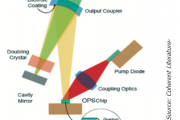 2017-08-06
2017-08-06
Augmented Reality (AR) is thought by many, including many of the leading CEOs in Silicon Valley, to be the “next big thing,” ultimately displacing our smartphones with stylish, interactive glasses that communicate with the digital world, in part by superimposing virtual images on the wearer’s field of view. Huge investment is pursuing this vision, much of it focused on micro-displays and sophisticated optics for overlaying images onto a wearer’s view. But just as promising is the idea of scanning such images directly into the human eye. Needed are very low power lasers or laser arrays in RGB or more colors that can be packaged in very small, discreet form factors suitable for integration into attractive, fashionable eyewear. Such lasers do not yet exist, but a technology that meets the challenge is in development, which can also lever the existing manufacturing infrastructure for LEDs. It can also address many other applications in emerging bio-tech and even in SSL markets for highly directional lighting.
Continue reading →
 2017-07-31
2017-07-31
LumiGrow Inc., a smart horticultural lighting company, released their LED Growers’ Guide for Vine Crops. The guide is intended to instruct vine crop growers how to use LED lighting strategies to maximize profits, boost yields, increase crop quality, and elicit desired plant characteristics.
Continue reading →
 2017-07-18
2017-07-18
Often, the LED lighting system consists of a (wall) dimmer or controller, a driver and a luminaire. To dim the light, you move the slider or turn the wheel and the dimmer sends a signal to the driver. The driver translates that signal to an electrical current that powers the LED.
Continue reading →
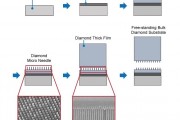 2017-05-05
2017-05-05
The Japanese component manufacturing company Namiki recently announced several technological advancements and equipment upgrade for advanced industrial component production. Namiki successfully produced unprecedented large sized diamond substrates and realized the bonding of two different materials under room temperatures; moreover, the corporation reinvented its cleaning system enabling defect-free small scale wafer cleaning and drying.
Continue reading →
 2017-05-04
2017-05-04
A Catheterization Laboratory is an instrumentally vital aspect of any hospital or healthcare facility. Commonly referred to as cath lab, this type of examination room is equipped with diagnostic imaging technology to give physicians visual access to chambers and arteries of the heart. In these spaces, a team of physicians perform life-saving procedures including coronary angiography, catheterization, balloon angioplasty, percutaneous coronary intervention, congenital heart defect closure, stenotic heart valves, and pacemaker implantations.
Continue reading →
 2017-04-06
2017-04-06
Snapshot reports use data from DOE's LED Lighting Facts product list to compare the LED performance to standard technologies, and are designed to help lighting retailers, distributors, designers, utilities, energy efficiency program sponsors, and other stakeholders understand the current state of the LED market and its trajectory.
Continue reading →
 2017-03-31
2017-03-31
To eradicate any cancer cells that may potentially remain after surgery or chemotherapy, many breast cancer patients also undergo radiation therapy. All patients experience unfortunate side effects including skin irritation, and sometimes peeling and blistering. Patients can also develop permanent discoloration of the skin and thickening of the breast tissue months, or even years, after treatment. There is currently no method to predict the severity of these acute and late effects, and even current evaluation of these effects are based on subjective scoring.
Continue reading →
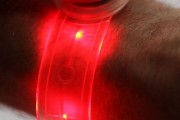 2017-03-30
2017-03-30
VTT Technical Research Centre of Finland has, for the first time, performed all manufacturing stages for a flexible in-moulded LED foil-in roll-to-roll process. The purpose of this demo is to prove the suitability of the technique for the highly cost-effective manufacture of products such as flexible LED displays containing printed electronics.
Continue reading →
2017-02-18
Solution based materials are a different way of processing the conventional OLED materials. So conventional OLED materials are processed by vacuum thermal deposition or heating up a powder in a crucible and evaporating it onto the substrate. Solution process materials are dissolved in a variety of solvents and then they can be coated by spin coating for lab sized experiments, or ink-jet printing, or slot-die coating, or a variety of other printing methods.
Continue reading →
2017-02-18
Light extraction is the process of removing light from the device itself. So when the device emits a photon, it gets trapped in the glass, in the organic layers themselves in the metals. And the-- what our challenge is, is to get all of that light into the viewing angle. So that when somebody sees the OLED they're seeing the full efficiency of that device. Rather than having light lost in the various segments.
Continue reading →
2017-02-18
The thing that actually converts electricity into light is the emitter itself. So there are a number of scientific challenges that are still out there in OLEDs, particularly in emitters. Even though you can go to the cell phone store and buy yourself a cell phone that's powered by OLED emitters, and active matrix OLEDs are present in cell phones and in televisions, and it leads people to think that all of the issues are solved.
Continue reading →
2017-02-18
OLEDs are based on organic (carbon-based) materials. Unlike LEDs, which are small point sources, OLEDs are made in sheets that provide a diffuse-area light source. While developing rapidly, OLED technology is less mature than LED technology, whose rapid advancement has created a moving target for OLED products in terms of lighting performance and pricing. Still, OLED manufacturers are optimistic that with a few key breakthroughs, OLEDs will offer a value proposition complementary with LED lighting approaches.
Continue reading →
2017-02-18
Like any new technology, LED lighting must demonstrate a compelling value to buyers before it begins to win sizeable market share from the incumbent technologies it will replace. Over the past decade, research and development have yielded impressive improvements in the cost, color performance, light output, efficacy, reliability, lifetime, and manufacturability of LED products. Looking at LED packages specifically, the cost in dollars per kilolumen ($/klm) has been declining rapidly since 2005 at a rate of around 20% per year. As a result, LED lighting products have become competitive in almost every lighting application, but there is still room for improvement.
Continue reading →
 2017-02-07
2017-02-07
Take a look at this wonderful infographic which graphically illustrates how we can induce wellness in our day to day lives with correct positioning of lights.
Continue reading →
2017-01-11
Researchers at Aalto are the first to develop a plasmonic nanolaser that operates at visible light frequencies and uses so-called dark lattice modes.
Continue reading →
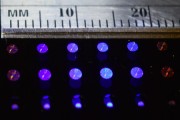 2017-01-11
2017-01-11
Engineers at Caltech have developed a system of flat optical lenses that can be easily mass-produced and integrated with image sensors, paving the way for cheaper and lighter cameras in everything from cell phones to medical devices.
Continue reading →
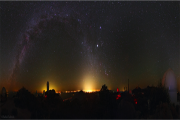 2017-01-10
2017-01-10
Artificial light at night is a threat to astronomical research, personal safety, and the health of both humans and wildlife. The problem is worsening with the proliferation of LED billboards and blue-rich white light LEDs as an option for street lighting. Within five years, LED technology will take over as the dominant type of outdoor lighting technology. With this in mind, scientists and lighting engineers say now is the time to implement strategies for reducing light pollution. By working together, they are identifying the best type of LED to use while suggesting actions that minimize intrusive lighting.
Continue reading →
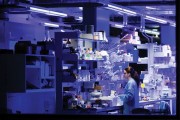 2017-01-10
2017-01-10
Bennett McIntosh for the Office of the Dean for Research at Princeton University analyzes the future of light technologies in this feature article. One hundred years ago, Italian chemist Giacomo Ciamician predicted a future society that would run on sunlight.
Continue reading →
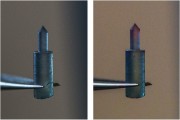 2017-01-04
2017-01-04
Tufts University engineers have created a new format of solids made from silk protein that can be preprogrammed with biological, chemical, or optical functions, such as mechanical components that change color with strain, deliver drugs, or respond to light, according to a paper published online this week in Proceedings of the National Academy of Sciences (PNAS).
Continue reading →
 2017-01-04
2017-01-04
Germanium may not be a household name like silicon, its group-mate on the periodic table, but it has great potential for use in next-generation electronics and energy technology.
Continue reading →
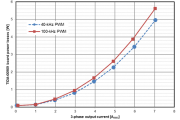 2017-01-03
2017-01-03
Zoé Pál Bőle from Texas Instrument (TI) shares in this blog entry the benefits of using GaN trasnsitors for high-speed motor drive applications compared to conventional silicon transistor technologies.
Continue reading →
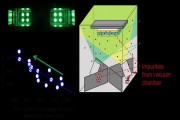 2016-12-29
2016-12-29
Reproducibility is a necessity for science but has often eluded researchers studying the lifetime of organic light-emitting diodes (OLEDs). Recent research from Japan sheds new light on why: impurities present in the vacuum chamber during fabrication but in amounts so small that they are easily overlooked.
Continue reading →
 2016-12-21
2016-12-21
The Defense Advanced Research Projects Agency has awarded a US $1.3 million grant to a team led by UCF researcher Debashis Chanda to fund the development of a next-generation infrared detector that could be used in fields as varied as night vision, meteorology and space exploration.
Continue reading →
 2016-12-19
2016-12-19
Quantum computing is heralded as the next revolution in terms of global computing. Google, Intel and IBM are just some of the big names investing millions currently in the field of quantum computing which will enable faster, more efficient computing required to power the requirements of our future computing needs.
Continue reading →
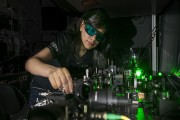 2016-12-13
2016-12-13
ANU scientists have designed a nano crystal around 500 times smaller than a human hair that turns darkness into visible light and can be used to create light-weight night-vision glasses.
Continue reading →
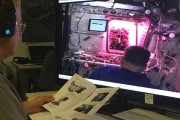 2016-12-09
2016-12-09
For a mid-afternoon snack, NASA astronaut Shane Kimbrough cut some of the "Outredgeous" Red Romaine lettuce leaves he nurtured during the past month aboard the International Space Station as part of a gardening harvest technique termed “cut-and-come-again.”
Continue reading →
2016-12-09
Incandescent globes have long been a staple of all buildings, lighting our way at all hours of the day. Unfortunately, incandescent bulbs are also terribly inefficient and their lifespan makes them an unsustainable choice for your office. Costs build up when using incandescent or fluorescent bulbs as light providers, and the wastage your company produces is also significant when compared to greener companies. What all this points to is a choice, either becoming a greener company or falling further and further behind modern company standards. Maybe it’s time to get commercial LED lighting installed, or solar panels, or rain water tanks for use in company toilets. We have assembled a list of five compelling reasons to make the switch in 2017.
Continue reading →
 2016-12-08
2016-12-08
Using LED lights flickering at a specific frequency, MIT researchers have shown that they can substantially reduce the beta amyloid plaques seen in Alzheimer’s disease, in the visual cortex of mice.
Continue reading →
 2016-12-08
2016-12-08
Gallium nitride (GaN) has emerged as one of the most important and widely used semiconducting materials. Its optoelectronic and mechanical properties make it ideal for a variety of applications, including light-emitting diodes (LEDs), high-temperature transistors, sensors and biocompatible electronic implants in humans.
Continue reading →
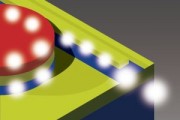 2016-12-07
2016-12-07
Combining silicon with a light-producing semiconductor may help develop micrometer-scale lasers, shows Doris Keh-Ting Ng and her colleagues from the A*STAR Data Storage Institute1.
Continue reading →
 2017-07-31
2017-07-31
 2017-07-18
2017-07-18
 2017-05-05
2017-05-05
 2017-05-04
2017-05-04
 2017-04-06
2017-04-06
 2017-03-31
2017-03-31
 2017-03-30
2017-03-30
 2017-02-07
2017-02-07
 2017-01-11
2017-01-11
 2017-01-10
2017-01-10
 2017-01-10
2017-01-10
 2017-01-04
2017-01-04
 2017-01-04
2017-01-04
 2017-01-03
2017-01-03
 2016-12-29
2016-12-29
 2016-12-21
2016-12-21
 2016-12-19
2016-12-19
 2016-12-13
2016-12-13
 2016-12-09
2016-12-09
 2016-12-08
2016-12-08
 2016-12-08
2016-12-08
 2016-12-07
2016-12-07